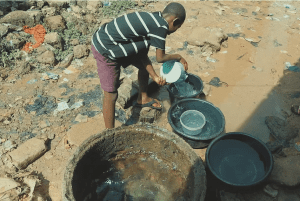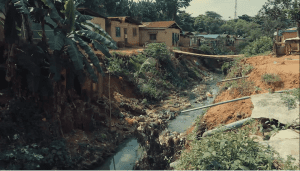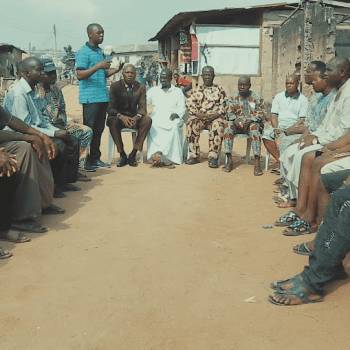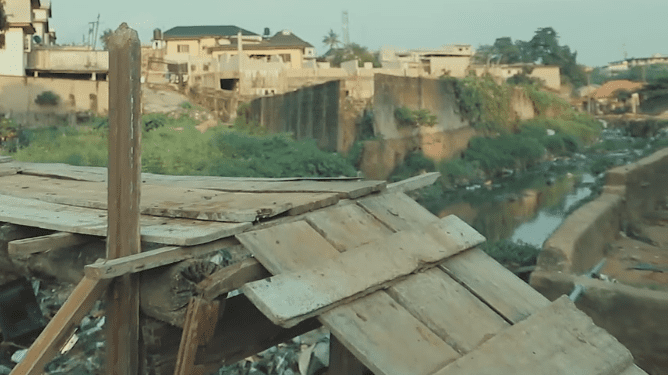Araromi is a settlement, located in a valley in Ojodu Local Council Development Area of Lagos State. Despite the community sitting in the heart of Ikeja, the capital city of Lagos State, the residents suffered protracted neglect by the successive governments in the state.
They lacked basic amenities such as access roads, water, electricity supply and basic health centre among others until Media Rights Agenda (MRA), a non-governmental organisation evoked the Freedom of Information (FOI) Act that began to change the fortune of the community.
Mr Dennis Eze, is a resident of the community. Eze recounted the deplorable state of the area before the intervention of the MRA. As a result of the bad road, he related how a pregnant woman, who was due for delivery, died on the way to the hospital.
“Pitiably, we lack potable water, health care facilities and electricity supply. Nevertheless, the residents were coerced to pay taxes and other levies. For decades, we had to resort to self-help, to ensure we manage to make a means for survival,” said the resident.
Ms Chukwueze Mary is another resident. She recounted how the community members used to fetch water from one well, the source of water she said was not that safe. She also noted that the electricity supply to the area was so erratic.

For the road, Chukwueze asserted that whenever it rained, it became swampy and inaccessible because of its deplorable state.

Similarly, Mr. Robert Friday said there had been a lot of communal efforts to make the area a living place, but unfortunately, the decades of neglect almost made it a mirage in spite of tax payments, until the NGO came to the rescue.
However, as soon as the NGO came in, the story began to change. Since the MRA office is located in the area, it felt the need to lend a helping hand, using the instrument of the Freedom of Information (FoI) Act.
FoI Act is a legislation, to make public records and information more freely available; provide for public access to public records and information; protect public records and information to the extent consistent with the public interest and the protection of personal privacy.
The law also protects serving public officers from adverse consequences of disclosing certain kinds of official information without authorisation and establishes procedures for the achievement of those purposes and; for related matters.
Since the assent of the law on May 28, 2011 by the then President, Dr. Goodluck Jonathan, it has been used by different groups in making the government accountable as well as in ensuring good governance for the citizens.
One of such groups that is using the law to engage the government is the MRA, whose mandate is to promote and protect the right to freedom of expression, media freedom, and access to information as well as digital rights and freedoms.
In 2016, the organisation evoked the law to draw the attention of Lagos State Government to the plight of the Araromi community, a step that ensured the community now has access to basic amenities.
In the beginning, the MRA engaged community leaders to evaluate the situation with a view to know the relevant agencies to approach. Relying on the Act, the organisation sent requests for information to five state ministries and agencies to seek their plans for the provision of certain essential social services and amenities for the community.

Mr. Ayode Longe, the MRA’s Programme Director, recalled that the Ministry of Health, State Primary Health Care Board, Ojodu Local Council Development Area, Lagos State Water Corporation (LSWC) and Ministry of Works and Infrastructure as the Ministries, Department and Agencies (MDAs) the organisation wrote to.
According to him, details of the information sought included copies of plans put in place by the MDAs to provide the Araromi community with health care services, water supply and electricity among other amenities, taking into consideration their peculiar needs and circumstances.
Longe noted that the request particularly enquired on why water supply was not extended to the community as well as details of any plan by the state water corporation to provide pipe-borne water to the community and its adjoining areas.
“We requested for the amounts budgeted each year from 2011 to 2016 for the provision and/or maintenance of road(s) for the community and copies of the relevant pages of the annual budgets.
“Out of the five agencies that the FoI requests were sent to, only the water corporation, and ministry of Works and Infrastructure responded; they provided some information while others declined.
“In the report of the water corporation, it said the peculiar topography of Araromi, being a settlement in a gully divided by a storm canal and prone to flooding, made it difficult to access. The corporation also claimed to be unable to meet the water demand in Lagos State,” said the programme director.
Interestingly, the water agency admitted that between December 2015 and September 2016, it collected more than N1.3 million from the community as water rate, though they didn’t make any plan to return the money neither did they provide the services because of the topography of the community.
Mr. John Gbadamosi, MRA’s Programme Officer who led the organisation’s initiative in an interview, said as a follow-up plan, the organisation took legal actions against the institutions that refused to respond to the FoI requests, although the court refused to grant MRA’s request for a leave in the FoI case after 7 months..
Besides the requests, a video documentary on the age-long neglect and infrastructural decay in Araromi had earlier been produced by the MRA for public sympathy and attention.
“Swiftly, the Lagos State Government began constructing a major road leading to the community. This gave access to a road network within the community”, Gbadamosi stated.
This road, he said, now connects Araromi to other adjoining communities within the Ojodu Local Council Development Area and it has apparently opened the door for business opportunities, bringing development to the area.
In addition, the state water corporation visited the community, where it met with the LCDA executives to determine the areas they needed assistance. They visited alongside with their tools and a copy of the FoI request received from the MRA.
Although there is still more to be done both on the demand and supply side, the Ararormi community has continued to enjoy the MRA-led initiative of leveraging on the FoI Act to bring social services to the area.
Notwithstanding the success of the initiative, the MRA boss bemoaned delay in response of some government agencies to FoI requests
“During MRA’s intervention, despite the efforts of the organisation in enlightening and mentoring members of the community to use the FoI Act to their advantage to draw the government’s attention to their plights, there were setbacks either because they were ignorant or unwilling to make requests because of some political affiliation to the ruling party.
“Due to the nature of the judicial system in Nigeria, some of the cases challenged by the MRA took so long in court. As a result, it slowed down the process of getting the government agencies to respond to MRA’s request which in turn affected the beneficiaries,” said Longe.
The programme director added that the MRA litigated the cases on its own without funding support. This, he said, also limited the organisation to continue with other cases, considering the long period in getting a judgement in the Nigerian court.
This story has been made possible by Nigeria Health Watch with support from the Solutions Journalism Network, a nonprofit organization dedicated to rigorous and compelling reporting about responses to social problems.


Comments 1